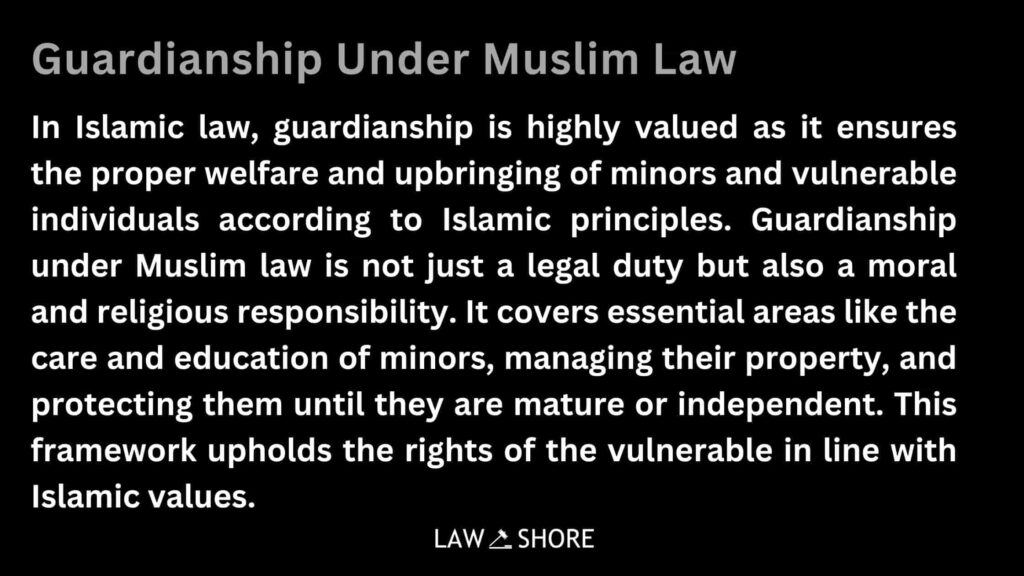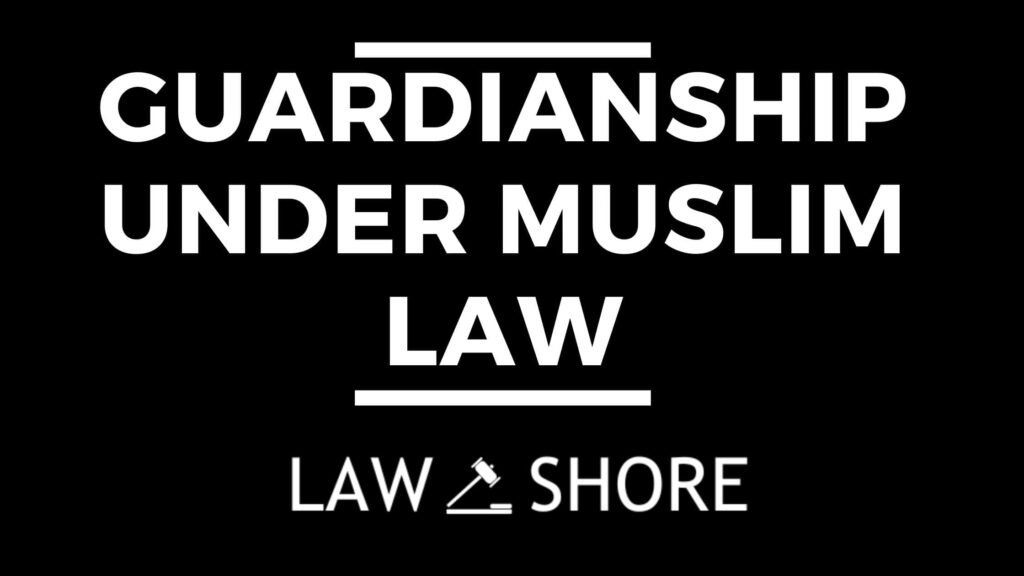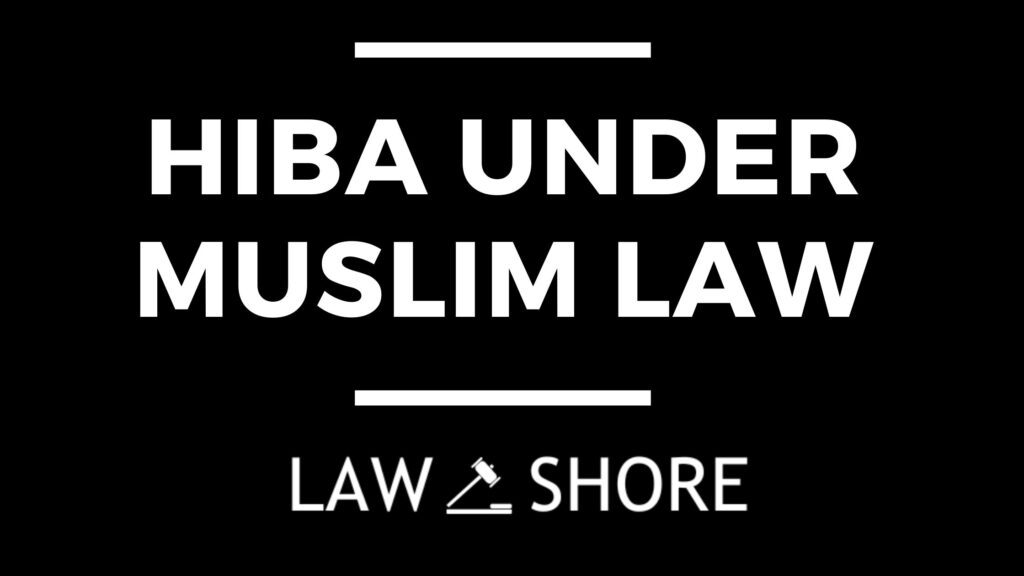What is Guardianship: In Legal Terms?
Table of Contents
ToggleGuardianship means having the legal right to take care of someone who can’t manage their own life, like a minor or a person unable to handle their affairs. This authority includes making decisions about their personal needs, finances, and legal issues. Guardianship in Muslim law is important because it helps protect the well-being, rights, and interests of the person being cared for.

Importance of Guardianship in Muslim Law
In Islamic law, guardianship is highly valued as it ensures the proper welfare and upbringing of minors and vulnerable individuals according to Islamic principles.
Guardianship under Muslim law is not just a legal duty but also a moral and religious responsibility. It covers essential areas like the care and education of minors, managing their property, and protecting them until they are mature or independent. This framework upholds the rights of the vulnerable in line with Islamic values.
Islamic View on Guardianship & Its Foundation in Shariah
In Islam, the concept of guardianship is based on Shariah, with principles taken from the Quran, the Sunnah (teachings of Prophet Muhammad, peace be upon him), and Islamic jurisprudence (Fiqh). Known as “Wilayah,” guardianship under Muslim Law is seen as a trust (Amanah) with key responsibilities.
– The Quran: In the Quran, a few verses stress the importance of caring for orphans and minors. For example, Surah An-Nisa (4:2-3) reminds us of the responsibility to treat orphans fairly and responsibly.
– The Sunnah: The Sunnah, or teachings of the Prophet Muhammad, emphasize taking care of those who depend on us and being responsible as guardians. He said, “Each one of you is a shepherd, and each one of you will be asked about his flock” (Sahih Bukhari and Sahih Muslim).
– Fiqh Principles: Islamic jurisprudence divides guardianship into two types:
Guardianship of the person (Wilayat al-Nafs): Focuses on personal care and upbringing.
Guardianship of property (Wilayat al-Mal): Involves managing the ward’s financial matters. Each type comes with specific duties and rules.
In short, guardianship under Muslim law, ensures that the guardian takes care of the dependent person while balancing their rights and responsibilities. It provides the necessary care and protection in line with Islamic values and legal principles.
Types of Guardianship in Muslim Law
Muslim law recognizes different types of guardianship under Muslim Law to help minors and others who cannot manage their own affairs. Each type explains the roles, responsibilities, and limits of guardians in various situations.
Let’s cover each type of Guardianship in Muslim law one-by-one:
Natural Guardianship under Muslim Law
Who Are Natural Guardians?
- Under Muslim law, the father is the primary guardian of a minor.
- If the father is not available or in his absence, the paternal grandfather takes on this role.
Primarily Responsibility and Authority
- Natural guardians are responsible for making decisions about a child’s upbringing, education, marriage, and property management.
- Their main duty is to take care of the child’s welfare and protect their interests.
- However, their authority has limits under Islamic principles. For example, they cannot misuse the child’s property or make decisions that harm the child.
Legal Guardianship (Court-Appointed Guardianship)
When is Legal Guardian Needed?
- A legal guardian is needed if there is no natural guardian or if the natural guardian is considered unfit.
- It may also be required if there are disputes over who should be the guardian or how the minor’s property is managed.
Role of the Court in Appointing a Guardian
- Courts step in to appoint a guardian to make sure the child’s needs and interests are protected.
- The guardian can be appointed to be responsible for personal care, like custody and education, or for managing property, like assets and inheritance, or sometimes both.
What are the Criteria for Appointing a Guardian?
- The court’s main focus is the child’s welfare.
- Close relatives are often preferred as guardians.
- The person chosen must be mentally fit, have good character, and be able to handle the responsibilities of being a guardian.
Testamentary Guardianship
What is a Testamentary Guardian?
- A testamentary guardian is someone chosen in a will by a natural guardian.
- For example, a father or paternal grandfather can name a guardian for the child in their will.
Conditions for Appointing a Testamentary Guardian
- The appointment of a testamentary guardian must follow Islamic laws.
- A Muslim father can appoint a guardian for his minor children. However, a Muslim mother’s right to appoint a guardian depends on her sect. For example, under Shia law, a mother cannot appoint a testamentary guardian.
Rights and Limitations
- A testamentary guardian takes over after the natural guardian passes away.
- They are responsible for the minor’s care and property but must always act in the child’s best interests.
De Facto Guardianship
What is De Facto Guardianship?
- A de facto guardian is someone who takes care of a child without being legally appointed as a guardian.
- This could be a relative, neighbor, or friend who steps in to look after the child when no official guardian is available.
Legal Recognition and Limitations
- Muslim law does not officially recognize de facto guardians.
- A de facto guardian cannot manage or sell a child’s property unless the court allows it.
- Their role is limited to providing care and support, without any legal authority over the child’s assets or major decisions.
Eligibility and Qualifications of Guardians Under Muslim Law
Muslim law sets specific criteria for who can be a guardian to ensure they handle their duties well. These rules focus on protecting the child’s welfare and following Islamic principles.
General Requirments for Guardianship under Muslim Law
- Age:
A guardian must be an adult, usually 18 years or older, depending on the laws where they live. This is to ensure they are mature enough to make good decisions for the child. - Mental Competence:
The guardian must be mentally stable and capable of making sound decisions. Someone with mental health issues that affect their judgment cannot become a guardian. - Good Character:
The guardian should have a good reputation and be trustworthy. They need to be responsible and honest to take care of the child’s needs and rights.
Gender Considerations in Guardianship under Muslim Law
Mother’s Role and Limitations Under Muslim Law:
- In Muslim law, the mother is not usually seen as the main legal guardian, especially for managing property. However, she often has custody rights, known as Hizanat, particularly for young children. This is because a mother’s care is considered essential for their early growth.
- Custody typically stays with the mother until the child reaches a specific age, like 7 years for boys and puberty for girls under Sunni law. After that, custody may go to the father or other paternal relatives unless the court decides otherwise to protect the child’s well-being.
- In some cases, like under Shia law, the mother might lose custody if she remarries someone who is not related to the child.
Preference for Male Guardians:
- In many situations, male family members, like the father, paternal grandfather, or brothers, are preferred as guardians of property. This is based on traditional roles in Islamic societies. However, this does not reduce the importance of the mother’s role in raising and caring for the child.
Religious Requirments
Preference for a Muslim Guardian:
- Muslim law usually prefers a guardian who is also Muslim to ensure the child is raised according to Islamic values.
- A non-Muslim is generally not allowed to be a guardian for a Muslim child unless no Muslim guardian is available, and the court decides it is best for the child.
- If a Muslim father chooses a guardian in his will (a testamentary guardian), that person is usually expected to be Muslim. However, if the father trusts that a non-Muslim guardian will take good care of the child, they may still be appointed.
Duties and Responsibilities of a Guardian
A guardian in Muslim law has important duties to look after the minor’s well-being and manage their property. These responsibilities are mainly divided into two primary categories: taking care of the minor personally and managing their property.
Management of the Child’s Person
Custody:
- The guardian is responsible for taking care of the minor, which includes providing them with a home, clothing, and food.
- Custody means keeping the child safe and ensuring their well-being, especially during their early years.
Education:
- It is the guardian’s responsibility to make sure the child gets a good education, which includes learning about religion, morals, and academics.
- The guardian should also create chances for the child’s intellectual and moral growth based on Islamic values.
Welfare:
- The guardian must focus on the child’s physical, emotional, and mental well-being.
- When making decisions about health care, discipline, and overall upbringing, the guardian should always keep the child’s best interests in mind.
Administration of Property
Management of Inherited Wealth:
- If the minor inherits property or wealth, the guardian is in charge of managing it until the child becomes an adult.
- The guardian must make sure the property is taken care of, invested wisely, or used only for the child’s benefit.
Prohibition Against Sale of Property:
- The guardian can’t sell or transfer the minor’s property unless there is a clear legal or religious reason.
- Any transactions involving the minor’s property must be done openly and, if necessary, approved by the court.
Preservation of Assets:
- The guardian must make sure the minor’s property is safe from loss, damage, or misuse.
- This includes paying taxes, managing rental income, and handling any businesses or investments related to the property.
Fiduciary Responsibilities
Acting in the Minor’s Best Interest:
- The guardian must always put the minor’s well-being first, above personal benefits.
- In Islam, guardianship is a trust (Amanah), and breaking this trust is a serious wrongdoing.
Avoiding Conflict of Interest:
- The guardian should not make transactions that benefit themselves by taking advantage of the minor.
- For example, the guardian can’t use the minor’s money for personal reasons unless allowed by law or the minor (once they are old enough).
Accountability:
- The guardian must keep accurate records of all financial transactions related to the minor’s property.
- When the minor becomes an adult, the guardian should give a clear report on the property and how it was managed.
Termination of Guardianship under Muslim Law
Guardianship under Muslim law doesn’t last forever and ends in certain situations. These criteria help make sure the ward becomes independent when the time is right or is kept safe from harm caused by an unsuitable guardian.
Child Reaching the Age of Majority
Legal Termination:
- Guardianship ends when the minor turns 18, which is the usual age in most legal systems, or earlier if the child is considered mature (Baligh) under Islamic law.
- In managing property, guardianship can continue until the minor is mature enough to handle their finances responsibly.
Rights of the Ward:
- When the child becomes an adult, they gain full control over their personal matters and property. They have the right to ask the guardian for a full report on how the property was managed.
Death of the Guardian
Automatic Termination:
- Guardianship ends when the guardian passes away, unless a guardian was specifically named in a will.
Subsequent Arrangements:
- If the natural guardian passes away, the responsibility may be passed to the next eligible guardian, like the paternal grandfather, or a guardian appointed by the court.
- If there is no suitable guardian, the court can step in and appoint one to make sure the child’s well-being is taken care of.
Court Intervention Due to Misconduct or Incompetence
Grounds for Removal:
- Poor handling of the minor’s property.
- Neglecting, abusing, or not doing the duties of a guardian.
- Doing things that harm the child’s well-being or go against Islamic values.
Role of the Court:
- The court can remove a guardian if there is proof of wrongdoing or inability to do their job.
- A new guardian might be chosen to ensure the minor’s well-being.
Rights of the Ward After Termination of Guardianship under Muslim Law
Access to Property and Accounts:
- When the ward turns of legal age, they can ask for a clear report of all transactions and how their property was managed while under guardianship.
Autonomy in Personal and Financial Affairs:
- The ward gains control over their own decisions regarding education, marriage, career, and property.
Right to Seek Redress:
- If the ward finds that their property was misused or lost because of the guardian’s mistakes or wrongdoing, they can take legal action.
Case Laws and Judicial Interpretations
Judicial decisions have played a key role in shaping how guardianship is understood and applied under Muslim law. These decisions show how courts work to balance Islamic principles with modern legal needs. Below we’ve mentioned some important cases and how the judiciary has handled conflicts related to guardianship under Muslim Law.
Significant Case Laws on Guardianship under Muslim Law
a. Mohammad Akhtar v. State (1951)
– Key Issue: This case addressed whether a mother could have the right to act as the guardian of her minor children.
– Judicial Interpretation: The court ruled that, while the father is usually considered the natural guardian, the mother could be given custody if the father’s ability to care for the children was in doubt or if it served the child’s best interest. The court prioritized the child’s welfare over strict legal guardianship rules.
b. Danial Latifi v. Union of India (2001)
– Key Issue: This case dealt with a Muslim woman’s right to maintenance under the Muslim Women (Protection of Rights on Divorce) Act. Although not directly about guardianship, it touched on guardianship in the context of family law.
– Judicial Interpretation: The court upheld the broader legal rights of women in marriage and highlighted the importance of a mother’s role in child custody. It emphasized that a mother’s responsibilities as a guardian should be protected, even after divorce.
c. Gita Hariharan v. Reserve Bank of India (1999)
– Key Issue: This case addressed whether a mother could act as a natural guardian for her minor son in financial matters when the father was not present.
– Judicial Interpretation: The Supreme Court decided that a mother could be recognized as a guardian in specific situations, especially if the father is absent, unable to act, or has passed away. This judgment clarified that a mother has the right to take on the guardian’s role under such circumstances, ensuring the child’s welfare.
Zainab v. State (2006)
– Key Issue: This case involved a conflict between the natural guardian (the father) and a guardian chosen by the deceased mother in her will.
– Judicial Interpretation: The court upheld the role of the testamentary guardian, provided it aligned with the child’s best interests. It emphasized balancing the mother’s wishes with the welfare of the minor, showing that guardianship arrangements can be flexible when the parent’s intent is clear and supports the child’s well-being.
Role of the Judiciary in Resolving Conflicts Regarding Guardianship
The judiciary plays an important role in resolving guardianship disputes under Muslim law, particularly when there are disagreements among family members or allegations of a guardian’s misconduct or inability to fulfill their duties.
Key responsibilities of the judiciary include:
- Interpreting Guardianship Rights:
Courts often need to clarify the rights of natural, legal, and testamentary guardians, and the scope of their authority. For example, when there’s a disagreement over a child’s custody (such as between a mother’s custody rights and the father’s guardianship), the court typically focuses on what’s best for the child, rather than strictly sticking to legal guardianship definitions. - Appointment of Guardians:
When no natural guardian is available or there’s a dispute between possible guardians, the court has the authority to appoint a legal guardian. The court’s role is to ensure the minor’s welfare is safeguarded in these cases. - Ensuring the Welfare of the Minor:
Courts may step in when a guardian fails to act in the child’s best interest, whether due to neglect, abuse, or mismanagement of the child’s property. This is especially critical when managing the minor’s inheritance or assets. - Balancing Islamic Law with Civil Law:
The judiciary often has to find a balance between applying traditional Islamic guardianship rules and modern legal principles like gender equality, child rights, and the welfare of the child. By doing so, courts help ensure that Islamic guardianship law adapts to changing societal values and legal frameworks. - Enforcing Parental Rights:
Courts also deal with situations where a guardian is accused of limiting the child’s relationship with the non-guardian parent. They ensure that both parents maintain a proper role in the child’s life and that the child’s connection with both parents is protected. - Judicial Discretion in Cases of Conflict:
In situations of serious conflict, such as abuse or neglect, courts may appoint an independent guardian or child welfare officer to safeguard the child’s well-being. In such cases, the court may go beyond traditional guardianship rules and prioritize the child’s safety and protection.
Challenges and Criticisms
The guardianship framework in Muslim law, based on Shariah principles, faces challenges and criticisms when it comes to adapting to modern societal changes. These issues arise from traditional limitations, unclear aspects, and shifting social dynamics.
Limitations and Ambiguities in the Traditional System
Rigid Hierarchy of Guardianship:
- The traditional system places the father and paternal grandfather at the top as natural guardians, often giving the mother a secondary role in legal guardianship. This hierarchy can be limiting, especially when the mother is more capable or available to care for the child.
- Additionally, some interpretations prevent mothers from serving as natural guardians of property, which can restrict their ability to protect the child’s financial interests.
Lack of Recognition for De Facto Guardians:
- People who take on the care of a child informally (de facto guardians) are not granted formal recognition or legal authority, even if they act in the child’s best interest. This leads to legal uncertainties and can result in disputes over custody or property.
Ambiguities in Testamentary Guardianship:
- Different interpretations between sects (e.g., Sunni vs. Shia law) can lead to confusion and disputes over testamentary guardianship. For example, some interpretations may restrict a mother’s ability to choose a guardian in her will, which can make things more complicated when no other guardian is available.
Modern Challenges
Issues with Gender Equality:
- It has been criticized as outdated and unfair to prefer male guardians over female guardians when it comes to property matters.
The limited role of mothers, especially in property decisions, is seen as not aligning with today’s values of gender equality. This problem becomes even worse when fathers or male relatives are not around or are not suitable for the role.
Globalized Family Structures:
- As more people move to different countries and families become spread out, traditional guardianship systems face new challenges.
Disputes can occur when one parent moves abroad with the child, making custody and guardianship issues more complicated because of the different laws and legal systems in each country.
Custody and Guardianship in Divorce Cases:
- Traditional rules can cause problems in divorce or separation cases, especially when the child’s well-being requires giving custody or guardianship to the mother or another relative instead of the natural guardian.
Impact of Modern Legal Systems:
- In many Muslim-majority countries, legal systems now combine Shariah law with civil law. This can lead to conflicts and inconsistencies, especially when civil law principles, like gender equality and child welfare, clash with traditional Islamic guardianship rules.
Challenges with Property Management:
- When a guardian mismanages or misuses a minor’s property, especially in inheritance cases, it becomes a big problem. While courts try to step in, the lack of strict rules in traditional systems can leave minors at risk of being taken advantage of.
How to Address the Challenges
To tackle these challenges, many legal systems in Muslim-majority countries are updating guardianship laws to better reflect modern values, while still honoring Islamic principles.
Some of the solutions that have been proposed or put into practice include:
- Promoting Gender Equality: Ensuring that mothers have equal rights in guardianship matters, including the management of property, to prioritize the child’s welfare and recognize the mother’s vital role in the child’s life.
- Recognizing De Facto Guardianship: Giving legal recognition and some authority to de facto guardians who act in the child’s best interests, with safeguards in place to prevent misuse.
- Harmonizing Traditional and Civil Laws: Creating legal systems that respect Islamic principles while incorporating modern child welfare standards and addressing the complexities of globalized family dynamics.
- Enhancing Oversight Mechanisms: Improving judicial and administrative oversight in guardianship cases, especially in managing minors’ property, to prevent exploitation and ensure greater transparency.
- Raising Awareness and Education: Increasing awareness of guardianship rights among parents, caregivers, and legal professionals through educational programs. This helps ensure a better understanding of the laws, and reduces conflicts.
Conclusion
Overall, Guardianship under Muslim law is very crucial as it ensures that minors are cared for, protected, and brought up well. It focuses on their physical, emotional, and financial well-being. Based on Shariah, the guardianship framework shows how Islam values the welfare and development of children as a trust (Amanah) from Allah.
By giving clear roles and duties to guardians, this system protects children’s rights and keeps their best interests in line with religions and moral values.
However, the traditional guardianship system has some challenges in today’s world. It gives strict priority to certain relatives as guardians, limits the role of mothers, and struggles with complicated family situations. These issues can clash with modern ideas about equality, child rights, and changing family setups. To address these gaps, there’s a need for a balanced approach that respects Islamic values while meeting the needs of today’s society.
To ensure the best for the child, the guardianship system should align with the framework of Islamic law. This means focusing on the child’s welfare, making sure property is managed responsibly, and giving fair recognition to both parents. By balancing traditional values with modern legal systems, Muslim law can protect children’s rights while handling any challenges.
At last, by balancing faith and fairness, guardianship in Muslim law will continue to evolve in ways that protect minors’ rights and well-being while honoring both traditional and modern values.
Also, Check Out Other Topics in Family Law:
Explore Law Shore: law notes today and take the first step toward mastering the fundamentals of law with ease.

After Completing my LLB hons, I started writing content about legal concepts and case laws while practicing. I finally started Law Shore in 2024 with an aim to help other students and lawyers.



